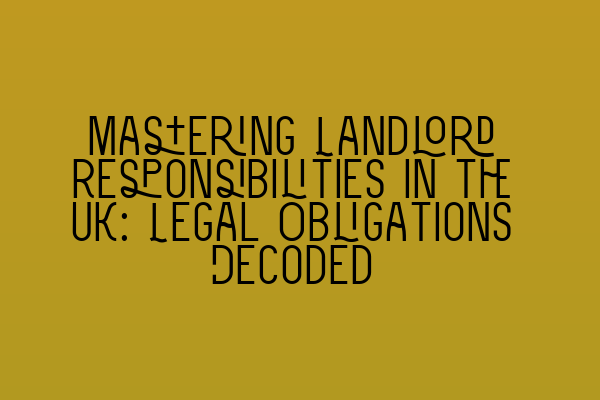Mastering Landlord Responsibilities in the UK: Legal Obligations Decoded
As a landlord in the UK, it is crucial to understand your legal obligations and responsibilities. Failing to comply with these responsibilities can lead to legal disputes, financial penalties, and damage to your reputation as a landlord. In this blog post, we will decode the legal obligations of a landlord in the UK, ensuring you have a thorough understanding of your role and the laws that govern it.
1. Providing a Safe and Habitable Property
One of the primary responsibilities of a landlord is to provide a safe and habitable property for your tenants. This means ensuring that the property meets all health and safety requirements, such as having working smoke alarms and gas safety certificates. Regular maintenance checks should be carried out to identify and rectify any potential hazards.
2. Repair and Maintenance
Landlords are legally obliged to keep the property in good repair. This includes addressing any structural issues, fixing faulty appliances, and maintaining the property’s overall condition. Failing to carry out necessary repairs can lead to legal action by the tenant, so it is crucial to be proactive in this regard.
3. Deposit Protection
Under the laws in the UK, landlords are required to protect their tenants’ deposits in a government-approved deposit protection scheme. This ensures that the deposit is held securely and can be returned to the tenant at the end of the tenancy, provided there are no disputes on damages or unpaid rent.
4. Right to Rent Checks
Since 2016, it has been a legal requirement for landlords to carry out Right to Rent checks on all prospective tenants. This ensures that the tenant has the legal right to live in the UK before they are granted a tenancy agreement. Failing to do so can result in penalties and legal repercussions.
5. Compliance with Gas and Electrical Safety Regulations
Landlords have a legal duty to ensure that the gas and electrical installations in their properties are safe. This involves having annual gas safety checks conducted by a certified Gas Safe engineer and ensuring that any electrical installations and appliances are tested and certified by a qualified electrician. Failure to comply with these regulations can have severe consequences, including fines and even imprisonment.
6. Energy Performance Certificates (EPCs)
An Energy Performance Certificate (EPC) is required before a property can be rented out in the UK. This certificate provides information about the energy efficiency of the property and recommends ways to improve it. Landlords must provide a valid EPC to tenants and potential tenants, failing which may result in financial penalties.
7. Maintaining Privacy and Data Protection
Landlords must respect their tenants’ privacy and comply with data protection laws. This means ensuring that any personal information collected from tenants is stored securely and only used for legitimate purposes. Landlords should also provide their tenants with a privacy notice detailing how their personal data will be used and protected.
By understanding and fulfilling these legal obligations, you can ensure that you are operating as a responsible and law-abiding landlord. However, it is advisable to seek professional advice from a property law solicitor to navigate this complex landscape effectively.
If you’re preparing for the SQE 1 exam or looking for practice questions and mock exams, SQE Property Law & Land Law offers an extensive collection of practice materials, including MCQ practice quiz and practice mocks FLK1 and FLK2. We also provide SQE 1 and SQE 2 preparation courses to help you succeed in your exams.
Stay updated with the SRA SQE exam dates by visiting our website regularly.
Remember, mastering your landlord responsibilities is not only a legal requirement but also essential for maintaining a healthy relationship with your tenants and protecting your investment.
